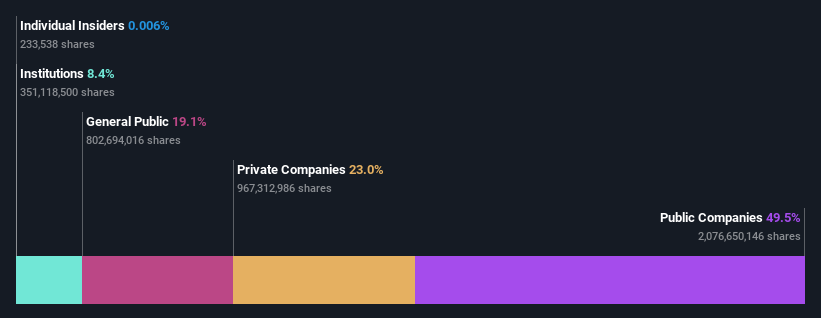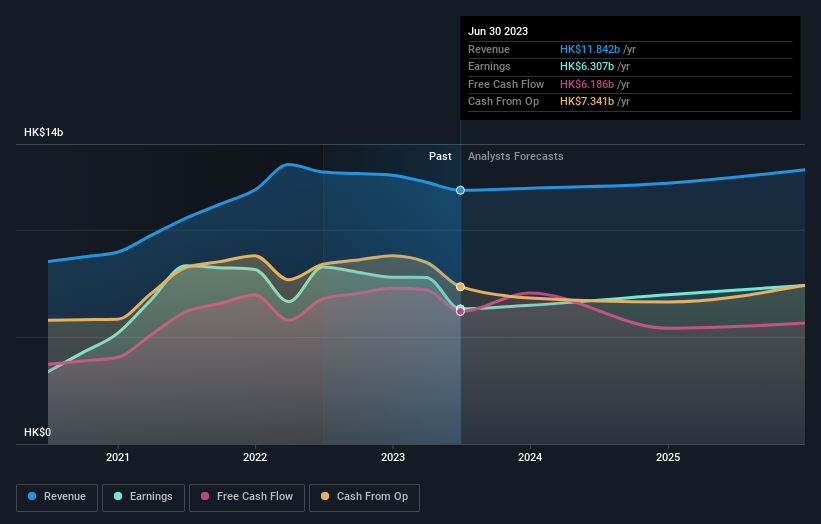Stock Analysis
- Hong Kong
- /
- Infrastructure
- /
- SEHK:144
Private companies own 23% of China Merchants Port Holdings Company Limited (HKG:144) shares but public companies control 49% of the company

Key Insights
- Significant control over China Merchants Port Holdings by public companies implies that the general public has more power to influence management and governance-related decisions
- A total of 2 investors have a majority stake in the company with 72% ownership
- Analyst forecasts along with ownership data serve to give a strong idea about prospects for a business
A look at the shareholders of China Merchants Port Holdings Company Limited (HKG:144) can tell us which group is most powerful. We can see that public companies own the lion's share in the company with 49% ownership. In other words, the group stands to gain the most (or lose the most) from their investment into the company.
And private companies on the other hand have a 23% ownership in the company.
Let's delve deeper into each type of owner of China Merchants Port Holdings, beginning with the chart below.
View our latest analysis for China Merchants Port Holdings

What Does The Institutional Ownership Tell Us About China Merchants Port Holdings?
Institutional investors commonly compare their own returns to the returns of a commonly followed index. So they generally do consider buying larger companies that are included in the relevant benchmark index.
As you can see, institutional investors have a fair amount of stake in China Merchants Port Holdings. This suggests some credibility amongst professional investors. But we can't rely on that fact alone since institutions make bad investments sometimes, just like everyone does. If multiple institutions change their view on a stock at the same time, you could see the share price drop fast. It's therefore worth looking at China Merchants Port Holdings' earnings history below. Of course, the future is what really matters.

China Merchants Port Holdings is not owned by hedge funds. China Merchants Port Group Co., Ltd. is currently the largest shareholder, with 49% of shares outstanding. In comparison, the second and third largest shareholders hold about 22% and 1.6% of the stock.
To make our study more interesting, we found that the top 2 shareholders have a majority ownership in the company, meaning that they are powerful enough to influence the decisions of the company.
While studying institutional ownership for a company can add value to your research, it is also a good practice to research analyst recommendations to get a deeper understand of a stock's expected performance. There are plenty of analysts covering the stock, so it might be worth seeing what they are forecasting, too.
Insider Ownership Of China Merchants Port Holdings
The definition of company insiders can be subjective and does vary between jurisdictions. Our data reflects individual insiders, capturing board members at the very least. Management ultimately answers to the board. However, it is not uncommon for managers to be executive board members, especially if they are a founder or the CEO.
I generally consider insider ownership to be a good thing. However, on some occasions it makes it more difficult for other shareholders to hold the board accountable for decisions.
Our information suggests that China Merchants Port Holdings Company Limited insiders own under 1% of the company. But they may have an indirect interest through a corporate structure that we haven't picked up on. It is a pretty big company, so it would be possible for board members to own a meaningful interest in the company, without owning much of a proportional interest. In this case, they own around HK$2.3m worth of shares (at current prices). It is always good to see at least some insider ownership, but it might be worth checking if those insiders have been selling.
General Public Ownership
The general public-- including retail investors -- own 19% stake in the company, and hence can't easily be ignored. While this size of ownership may not be enough to sway a policy decision in their favour, they can still make a collective impact on company policies.
Private Company Ownership
It seems that Private Companies own 23%, of the China Merchants Port Holdings stock. Private companies may be related parties. Sometimes insiders have an interest in a public company through a holding in a private company, rather than in their own capacity as an individual. While it's hard to draw any broad stroke conclusions, it is worth noting as an area for further research.
Public Company Ownership
We can see that public companies hold 49% of the China Merchants Port Holdings shares on issue. We can't be certain but it is quite possible this is a strategic stake. The businesses may be similar, or work together.
Next Steps:
I find it very interesting to look at who exactly owns a company. But to truly gain insight, we need to consider other information, too. Consider risks, for instance. Every company has them, and we've spotted 2 warning signs for China Merchants Port Holdings you should know about.
Ultimately the future is most important. You can access this free report on analyst forecasts for the company.
NB: Figures in this article are calculated using data from the last twelve months, which refer to the 12-month period ending on the last date of the month the financial statement is dated. This may not be consistent with full year annual report figures.
Valuation is complex, but we're helping make it simple.
Find out whether China Merchants Port Holdings is potentially over or undervalued by checking out our comprehensive analysis, which includes fair value estimates, risks and warnings, dividends, insider transactions and financial health.
View the Free AnalysisHave feedback on this article? Concerned about the content? Get in touch with us directly. Alternatively, email editorial-team (at) simplywallst.com.
This article by Simply Wall St is general in nature. We provide commentary based on historical data and analyst forecasts only using an unbiased methodology and our articles are not intended to be financial advice. It does not constitute a recommendation to buy or sell any stock, and does not take account of your objectives, or your financial situation. We aim to bring you long-term focused analysis driven by fundamental data. Note that our analysis may not factor in the latest price-sensitive company announcements or qualitative material. Simply Wall St has no position in any stocks mentioned.
About SEHK:144
China Merchants Port Holdings
China Merchants Port Holdings Company Limited, an investment holding company, operates as a port operator in Mainland China, Brazil, Hong Kong, Taiwan, and internationally.
Good value with mediocre balance sheet.

